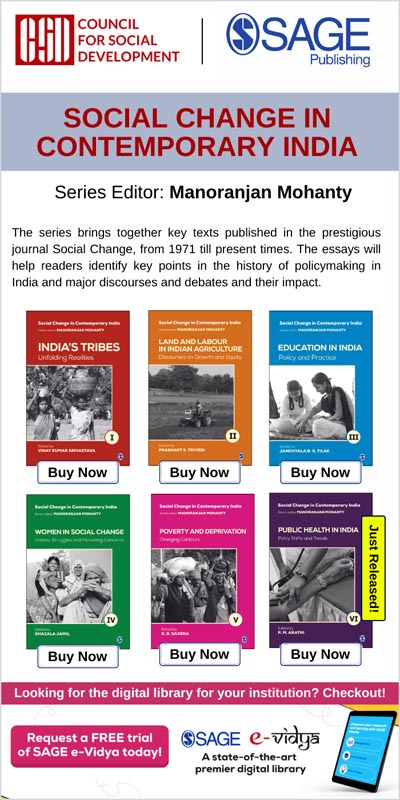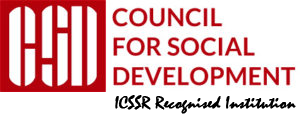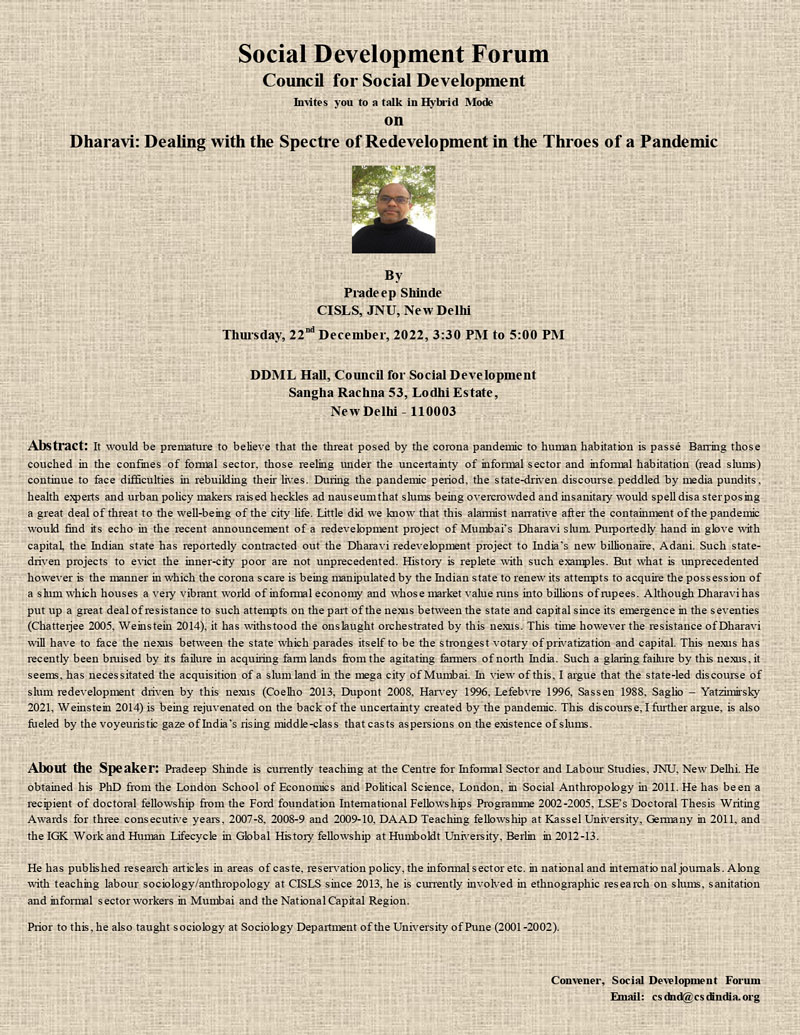The Caste Question in Hindi Cinema: Where are Dalits in Bollywood’ on 25th November, 2022
The Social Development Forum of the CSD invites you to attend a talk on ‘The Caste Question in Hindi Cinema: Where are Dalits in Bollywood‘ by Dr. Akhil Alha
Date: 25th November, 2022.
Time: 3.30 pm
Venue: DDM Hall, CSD, 53 Lodi Estate, New Delhi
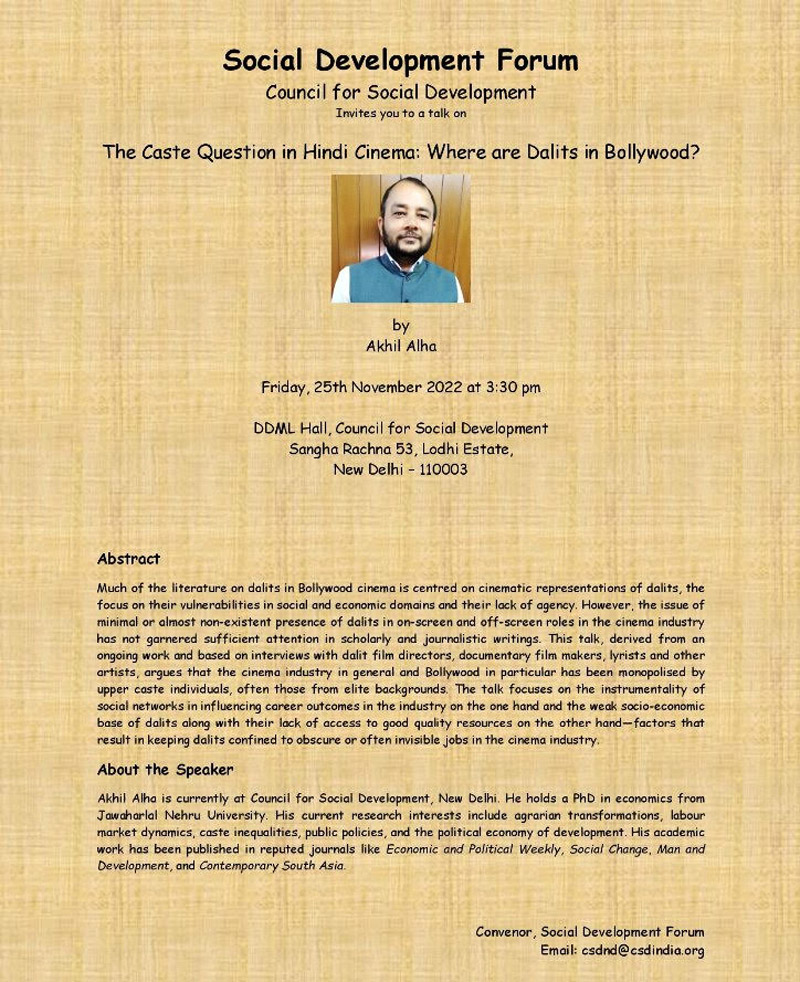
Book Discussion Programme on “Ideology and Organization in Indian Politics” by Zoya Hasan on 25th November 2022
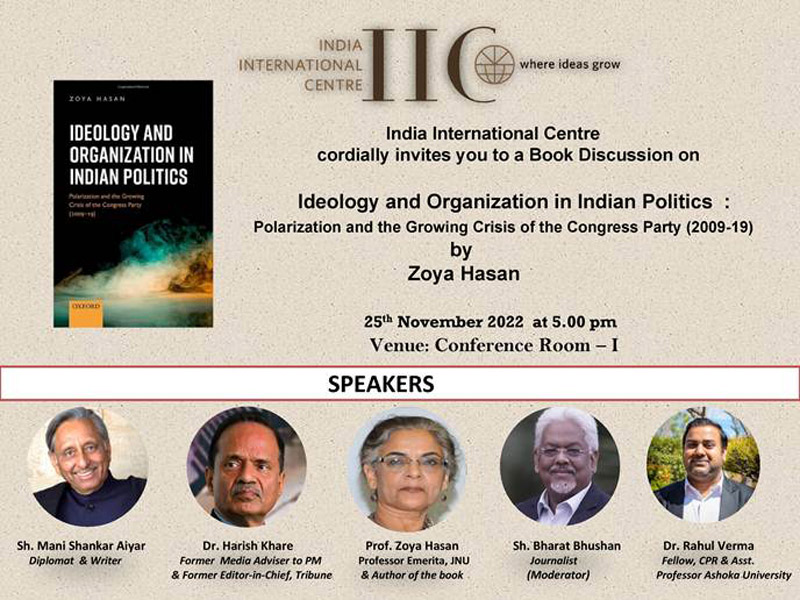
Ideology and Organization in Indian Politics:
Polarization and the Growing Crisis of the Congress Party (2009-19)
by
Zoya Hasan
25th November 2022 at 5.00 pm
Venue: Conference Room – I
About the book : Ideology and Organization in Indian politics examines the immense changes that have occurred in Indian politics over the past decade and its impact on the Indian National Congress. The impact is most apparent in the changing fortunes of the Congress party, which suffered two major defeats in 2014 and 2019 elections, bringing the party’s crisis to the front and centre of public debate. This book seeks to understand the reasons for these enormous changes by looking first at the underlying conditions that led to the decline of the Congress and second the challenges – both external and internal-confronting the Congress and, while doing so, estimating its impact on Indian politics and on the Congress.
Speakers :
Sh. Mani Shankar Aiyar, Diplomat & Writer
Dr. Harish Khare, Former Media Advisor to PM & Former Editor-in-Chief, Tribune
Sh. Bharat Bhushan, Journalist (Moderator)
Dr. Rahul Verma, Fellow, Centre for Policy Research & Assistant Professor, Ashoka University
Prof. Zoya Hasan, Professor Emerita, Jawaharlal Nehru University & Author of the Book.
Please make a note
- Physical programmes will be held as per the Covid -19 guidelines.
- Wearing of face masks is mandatory and will be strictly enforced. Entry will not be permitted to anyone not wearing a mask.
- The Audience are requested to arrive at the venues, at least 10 minutes prior to the programmes in order to facilitate the screening process at the Door.
- Seating will be on the first come basis.
We request audiences to kindly abide by the above regulations
Workshop on Capacity Building for Resettlement and Rehabilitation of Project Displaced People
Rescheduling of the Workshop on Capacity Building
for Resettlement and Rehabilitation of Project Displaced People
February 27-28, 2023
At
India International Centre, New Delhi
Objectives:
- to familiarize the participants with the complex issues surrounding land acquisition and resettlement
- to develop among them ability to do Social Impact Assessment and resettlement planning
- to enhance implementation and monitoring skills.
Participants:
- senior/middle level government officials,
- industry managers,
- NGOs,
- academics, and
- those working on internationally-funded projects.
Course Contents:
- Land Acquisition Law and Rehabilitation Policy: A Historical Perspective
- Land Rehabilitation and Resettlement Act 2013: Background, Context and Implementation
- Social Impact Assessment
- Environmental Impact Assessment
- Tribal and Gender Issues in Resettlement Projects
- Social Movements against Displacements
- Resettlement and Rehabilitation: Case Studies
- Relocation and Resettlement in Urban Areas
- Best Practices in Resettlement & Rehabilitation
Course Contribution:
Revised Contributory Fee: INR 5,000;
Concessional Rates for Students and NGOs: INR 3,000
Need-based modest accommodation will be provided to a limited number of outstation participants.
Last date for receiving application/nominations is 5 February 2023.
For further information, please contact
Dr Nivedita Sharma
Assistant Professor
Council for Social Development, Delhi
Phone: 011-24692655/234
Email: nivedita@csdindia.org
Qualitative methods in Social Sciences: Ethnography, Narratives and Social Stories
Council for Social Development, New Delhi,
and G B Pant Social Science Institute, Prayagraj, A Constituent Institute of Allahabad University
Invite application for one week programme on
Qualitative Methods in Social Sciences: Ethnography, Narratives and Social Stories
(28 November to 02 December 2022)
Last Date of Application: 25 November 2022
Addendum
The date of submission has been extended upto 25th November.
A provision has been made for online participation for a limited number of candidates. Those who have difficulty in participating in OFFLINE mode may apply for online participation
Duration: One Week
Venue: Council for Social Development, New Delhi
Registration Form: click here
Eligible participants: Students/ researchers/ faculty members in research institutions/ universities/ colleges, development professionals and government officers.
Course contents: Understanding specificities of Indian society; different methods of qualitative research; selecting the field; the question of outsider and insider; selection of respondents; family tree and biographical notes of respondents; retrieving the memories; semi structured and un-structured interviews (Baat-se-baat methodology); focused group discussions (FGDs) to validate the facts and fill in the incomplete stories; capturing the silence, murmuring, half sentences; inclusion of left out resources (proverbs, folk stories and songs); content analysis and discourse analysis; visual representation of qualitative data; writing social stories
Course contribution: Rs. 6000/- (inclusive of kit bag, course material, lunch & refreshments)
Payment through online transfer/Crossed Cheque/ DD in favour of Council for Social Development, payable at Delhi or NEFT (A/c no. 600720100050048, Bank of India, IFSC Code BKID0006007)
Application details: www.csdindia.org / http://www.gbpssi.in/
Contact: Dr. Archana Singh: archanaparihar@gmail.com
Ms Jaya Lekshmi Nair: jaya@csdindia.org
Objectives
This workshop aims at providing a perspective on social science research on the Indian society that has been dominated by borrowed concept from western theories and practices, which if not applied carefully, often miss out the nuances of plurality, saliences of diversity and other unique features of the Indian society. This workshop is focused on qualitative methods and intends to provide a perspective on qualitative research in India’s context. It aims at imparting training on the practical aspects of application of various qualitative methods and expose the participants towards the limitations of blind application of text book knowledge to the field, especially in India’s settings.
Training Modules
1: Understanding qualitative research and Specificities of Indian society
2: Preparing the researcher for qualitative research and introducing different methods
3: Selecting the field: deconstructing the debate of own society vs. others societies
4: Relating with field: blurring the boundaries of outsider and insider
5: Field research: selection of respondents; family tree and biographical notes of respondents; retrieving the memories; semi structured and un-structured interviews (Baat-se-baat methodology); focused group discussions (FGDs) to validate the facts and fill in the incomplete stories; field diary, notes and queries of observations; capturing the silence, murmuring, half sentences
6: Data analysis: transcription; reading the field notes; inclusion of left out resources (proverbs, folk stories and songs); content analysis and discourse analysis; understanding the caste-orality
7: Visual representation of qualitative data
8: How to write social stories
Training Workshop on “Right Based Legislations for Social Development: Assessment and Prospects”
Date: 5-7 December 2022
Venue: DDML Hall, CSD, 53 Lodi Estate, New Delhi – 110003.
Council for Social Development plans to organise a three day Training Workshop on “Right Based Legislations for Social Development: Assessment and Prospects” taking into account the operation of the five important laws – The Mahatma Gandhi National Rural Employment Guarantee Act 2005, The Right of Children to Free and Compulsory Education Act, 2009, Forest Rights Act, 2006, National Food Security Act, 2013 and Land Acquisition, Rehabilitation and Resettlement Act, 2013.
The Workshop intends to provide detailed discussion by experts, of the process of formulation, provisions and implementation of these acts, and their contributions to social development of the country. Applications are invited from students & researchers, teachers, social workers, media persons and civil servants. Participants may send a statement of about 250 words indicating their area of interest in the workshop.
There is a nominal contribution of Rs. 1000 towards compilation of material and facilitation. A certificate will be provided on the completion of the workshop. Last day for receiving application is 15th November, 2022. Applications should be sent to jaya@csdindia.org
Tentative Programme
| Days | Time | Schedule |
Day I 5th December (Monday) | 2.00 – 4.00 PM | Overview Panel by Prof. Zoya Hasan, Prof. M Mohanty, and Prof. K. B. Saxena |
| 4.00 – 4.30PM | Break for Tea | |
| 4.30 – 6.00 PM | Lecture on The Mahatma Gandhi National Rural Employment Guarantee Act 2005 – by Prof Ashok Pankaj | |
Day II 6th December (Tuesday) | 2.00 – 3.30 PM | Lecture on The Right of Children to Free and Compulsory Education Act, 2009 – by Prof Muchkund Dubey |
| 3.30 -4.00 PM | Break for Tea | |
| 4.00 – 5.30 PM | Lecture on Forest Rights Act, 2006 by Prof K. B.Saxena | |
Day III 7th December (Wednesday) | 10.00 – 11.30 AM | Lecture on National Food Security Act, 2013 by Dr. Dipa Sinha |
| 11.30 – 11.45 AM | Break for Tea | |
| 11.45 AM – 1.15 PM | Lecture on Land Acquisition, Rehabilitation and Resettlement Act, 2013 by Prof K. B.Saxena | |
| 1.15 – 2.15 PM | Lunch | |
| 2.15 – 4.15 PM | Presentation of papers by Participants | |
| 4.15 – 4.30 PM | Break for Tea | |
| 4.30 – 6.00 PM | Assessment and Prospects PANEL Discussion by Experts |
नवोदित लेखक कार्यशाला – A Two Day Workshop of Hindi Writers in Social Sciences
Resources Persons: Prof K L Sharma, Prof Badrinarayan, Prof Ashok Pankaj, Dr Archna Singh
Valedictory Address: Shri Ashok Vajpayee
Council for Social Development, New Delhi, and Govind Ballabh Pant Social Science Institute, Prayagraj, organized a two-day workshop on 16-17 May 2022 at New Delhi for promoting Social Science writings in Hindi. Twenty Five participants from various places attended this workshop. The main focus of the workshop was to mentor them in writing social science research articles in Hindi.
A Two Day Workshop of Hindi Writers in Social Sciences
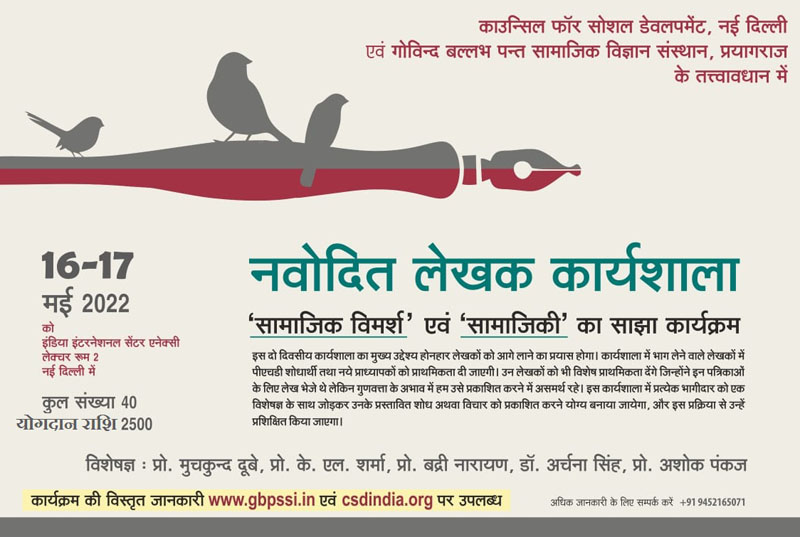
A Two Day Workshop of Hindi Writers in Social Sciences at New Delhi on 16-17 May, 2022
A joint venture of Samajik Vimarsh, Council for Social Development, New Delhi and Samajiki, G.B. Pant Social Science Institute, Prayagraj.
Dates: 16th – 17th May 2022
Venue: Lecture Room – II, IIC Annexe, New Delhi
CSD-ISID-IIC’s Book Discussion on ‘India’s Industrial Policy and Performance’
CSD-ISID-IIC’s Book Discussion on ‘India’s Industrial Policy and Performance’ by Nitya Nanda, Thursday, 12 May 2022. What implications have the post-1991 shift towards a ‘no policy is the best policy’ had for India’s industries and their performance? How best to undertake a comprehensive policy analysis and what would such an analysis throw up as suggestions for India’s industrial policy?
These were some of the questions addressed by experts gathered at India International Centre Annexe (hybrid mode) on Thursday, 12 May 2022 for a book discussion on ‘India’s Industrial
Policy and Performance’ by Nitya Nanda. The event was co-organised by Council for Social Development (CSD) Delhi, Institute for Studies in Industrial Development (ISID) Delhi, and India International Centre (IIC).
Moderated by Prof Nagesh Kumar (Director, ISID), the event began with the book author, Dr Nitya Nanda (Director CSD), explaining the importance of a comprehensive policy analysis – not just of India’s industrial policy but also of trade and investment policies and other development incentives – to understand India’s industrial policies and the performance of India’s industries.
While advocating a structural economic perspective towards this field and cautioning against an over-reliance on econometric models and analysis, Dr Nanda also noted that market failures are ubiquitous rather than exceptional. He also shed light on the fact that the only well-performing sectors – pharmaceuticals and automobile manufacturing, for instance – were those that still had a semblance of an industrial policy.
Subsequently, the experts in the panel – Prof Muchkund Dubey (President CSD), Prof Deepak Nayyar (Professor Emeritus, JNU), and Prof R Nagaraj (Visiting Professor, CDS Trivandrum) – placed several important observations on India’s industrial sector and sub-sectors.
Prof Dubey briefed the audience of India’s industrial policies since 1948, emphasising the state’s role in establishing and supporting institutions, the need to set up a manufacturing
sector capable of delivering key universal goods and services to all citizens, and the urgent need for the government to realise that rich rhetoric is not a substitute for policy implementation.
Noting the private sector’s disinterest and inability to deliver on these fronts, Prof Dubey called for greater state involvement in planning and implementation of industrial policies that dovetail with critical social development issues. He also recommended that the state make serious efforts in social sector transformation and in remedying the long-standing neglect of India’s agriculture. Both these sectors, he said, ought to be part of an integrated approach to India’s industrial policy.
Prof Deepak Nayyar (Professor Emeritus, JNU) highlighted that the contribution of India’s manufacturing sector to employment had peaked prior to market liberalisation. Challenging the
currently popular opinion that derides the 1950s-80s as a no-show, licence-raj period that had harmed manufacture through state interference and encouragement of rent-seeking behaviour, Prof Nayyar stressed that the country’s only three success stories – pharmaceuticals, automobiles, and software – had all derived their strengths and encouragement from the
policies and practices of these early post-independence decades, which ought to be recognised as a period of learning for Indian industries. Noting the irony in the worsening, rather than the improvement, of India’s manufacturing sector alongside its increased economic openness since 1991, Prof Nayyar strongly recommended that this sector be recognised as the only viable
source of employment. Instead of relying on the service sector to absorb its vast surplus labour, India must turn towards manufacturing, he suggested. Prof Nayyar also said it is time to go
beyond the ‘Make in India’ slogan and put in place an integrated policy and coordinated efforts to nurture an ecosystem conducive to manufacturing.
The third panellist, Prof R Nagaraj (CDS), spoke at length about the merits of the book under discussion while using the occasion to commend the policies and outlook of the Indian state
since 2014 in creating better opportunities for industries. Former Vice Chairman, NITI Aayog, and the event’s chief guest, Dr Rajiv Kumar, likewise praised the current government, its
infrastructure and ease-of-doing-business initiatives, and its thrust on turning India into a globally competitive player. Dr Rajiv Kumar and other panellists also released the South Asia
edition of Dr Nanda’s book.
In his concluding remarks on the event, Prof Nagesh Kumar (ISIS) re-emphasised the importance of a symbiotic relationship between the government and industries and other stakeholders. Ms Shoma Chaudhury, Senior Commissioning Editor, Routledge Taylor & Francis Group, gave the vote of thanks.
A video recording of the event is accessible at
Social Change in Contemporary India
The Council for Social Development and SAGE are delighted to invite you to the online launch of
Social Change in Contemporary India
(A six-volume thematic series of articles that have appeared in Social Change over the past 50 years)
March 25, 2022, Friday, 3.30 pm to 5.15 pm
Chair
Professor Muchkund Dubey, President Council for Social Development
Welcome
Professor Nitya Nanda, Director, Council for Social Development
Introduction
Series Editor Professor Manoranjan Mohanty
Council for Social Development and Delhi University, formerly editor, Social Change
Presentation of the volumes
Shri Vivek Mehra
SAGE Publications
Moderator
Professor Riaz Ahmad
Council for Social Development and Editor, Social Change
The series
India’s Tribes: Unfolding Realities (Vol. I)
Editor Vinay Kumar Srivastava
Discussant
S.M. Patnaik
Professor, Anthropology, Delhi University
Former Vice Chancellor Utkal University
Land and Labour in Indian Agriculture: Discourses on Growth and Equity (Vol. II)
Editor Prashant K. Trivedi
Discussant
Praveen Jha
Professor, Centre for Economic Studies and Planning, Jawaharlal Nehru University
Education in India (Vol. III)
Editor J.B.G.Tilak
Discussant
Avinash Kumar Singh
Professor, Department of Education Policy
National Institute of Education and Planning and Administration
Women in Social Change: Visions, Struggles and Persisting Concerns (Vol. IV)
Editor Ghazala Jamil
Discussant
Uma Chakravarti
Feminist Historian and Filmmaker
Poverty and Deprivation: Changing Contours.(Vol. V)
Editor K.B. Saxena
Discussant
Professor Manoj Panda
Former Director, Institute of Economic Growth, Delhi
Public Health in India: Policy Shifts and Trends (Vol.VI)
Editor P.M. Arathi
Discussant
Imrana Qadeer
Professor (retd.), Centre of Social Medicine and Community Health, Jawaharlal Nehru University
